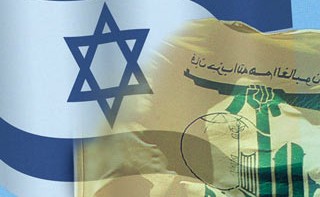 By Paul Alster
By Paul Alster
Hezbollah has long threatened Israel, but sources in the Jewish state fear that if an all-out war happens near the Lebanon border, it will happen not by design, but by accident.
Fighting on so many fronts, especially in chaotic Syria, where Iran has dispatched Hezbollah to help President Bashar al-Assad’s forces, could increase the chances of a rogue element firing rockets into Israel simply to draw the Jewish State into a war, say experts. Such a move could be made by elements of Hezbollah itself, or by its enemies, including Al Qaeda affiliate Al Nusra, which could frame Hezbollah to push it into war with Israel.
Elusive Hezbollah leader Hassan Nasrallah, in a recent, rare public appearance to mark the 15th anniversary of Israel’s unilateral withdrawal from Lebanon, insisted that Israel remains the group’s primary enemy. But with Hezbollah fighting alongside government forces in Syria and with those of its patron Iran in the ongoing war against ISIS in Iraq, the Lebanese-based militant group is stretched thin.
“We are present today in many places and we will be present in all the places in Syria that this battle requires,” Nasrallah said. “[But] our eyes are turned toward the main enemy [Israel] in the main campaign. We have not abandoned this front and will not abandon it. We must be present today on two fronts. We continue to be active on the front with Israel and other issues are not distracting us.”
If fighting breaks out with Israel, it will likely take place along the demilitarized Lebanese border region, where UNIFIL, the United Nations force in Lebanon, is deployed . Hezbollah is believed to have stockpiled up to 100,000 rockets in readiness for the next war with Israel, and a senior Iranian military commander last week threatened to “raze Haifa and Tel Aviv to the ground.”
“Gradually we are witnessing an increased level of resentment of Hezbollah, not to mention the level of resentment that is starting to building up amongst the Shi’a inside Hezbollah’s own community due to the tremendous death toll they have [sustained as a result of] the Syrian conflict.” Lebanese political scientist Mario Abu Zeid of the Beirut-based Carnegie Middle East Center, told Fox News in reference to the drop of Hezbollah’s popularity in Lebanon ”
But separating bluster for its constituents’ consumption from real threats has always been crucial, say experts. Since the 2006 Second Lebanon War, the border region had been generally peaceful until a cross-border attack in late-January by Hezbollah on an Israeli military vehicle that killed two soldiers and wounded seven more. It came in response to an alleged Israeli airstrike that killed a senior Iranian commander and a top Hezbollah field commander, amongst others, who were inspecting a ‘site’ on the Syrian side of the Golan Heights, close to the Israeli border. It appears though that Hezbollah backed off enflaming tensions any further.
“Hezbollah sent a message that this is only retaliation for what happened,” Lebanese political scientist Mario Abu Zeid of the Beirut-based Carnegie Middle East Center, told FoxNews.com.
“They had the opportunity to kidnap soldiers… but they knew this would ignite another war with Israel. At the present time, I don’t think there is any interest in Hezbollah engaging in a war. However, the regional dynamics might change at any time, especially with Iran’s [use of proxy armies] in Yemen, Iraq, Syria, and definitely with Hezbollah. The relationship between Hezbollah and the Iranian leadership is much deeper than a political or a military one. It is about religious and ideological ties.”
On Monday, Israel’s recently retired Chief of Staff, Lt-Gen. Benny Gantz, told Israel Radio that, “Israel has no interests beyond the northern and southern borders, other than security interests.” He warned though, “If we are challenged, we will know how to deal with it.”
Israel is monitoring events on its Syrian border very closely as Hezbollah and forces loyal to President Assad fight against a variety of radical Islamist organizations including the Al Nusra Front and ISIS, as well as other forces associated with the Free Syrian Army who themselves oppose Assad, but are equally targeted by Islamic extremists.
While some observers suggest Hezbollah has become a more dangerous fighting force through its battlefield experience in Syria and more recently Iraq, back home in Lebanon, the Shia militia, seen by so many locals as a ‘liberating national resistance force’ following its long war against Israel in the 1980s and 1990s, now appears to be struggling to maintain its popularity as a result of its blind allegiance to its Iranian paymasters and to Syria’s beleaguered President Assad.
“In the context of the Syrian war, Hezbollah is seen as an invading force in a conflict that doesn’t belong to the Lebanese people,” Mario Abu Zeid suggests. “It is now [seen by many] as acting… to achieve its own interests and not in anything related to the national interests of the Lebanese people.
“Gradually we are witnessing an increased level of resentment of Hezbollah, not to mention the level of resentment that is starting to building up amongst the Shi’a inside Hezbollah’s own community due to the tremendous death toll they have [sustained as a result of] the Syrian conflict.”
FOX NEWS

Leave a Reply
You must be logged in to post a comment.